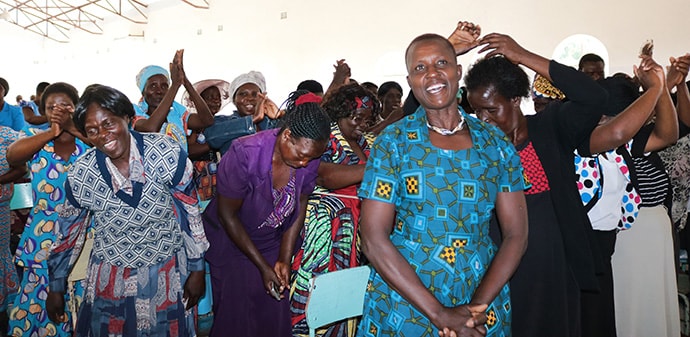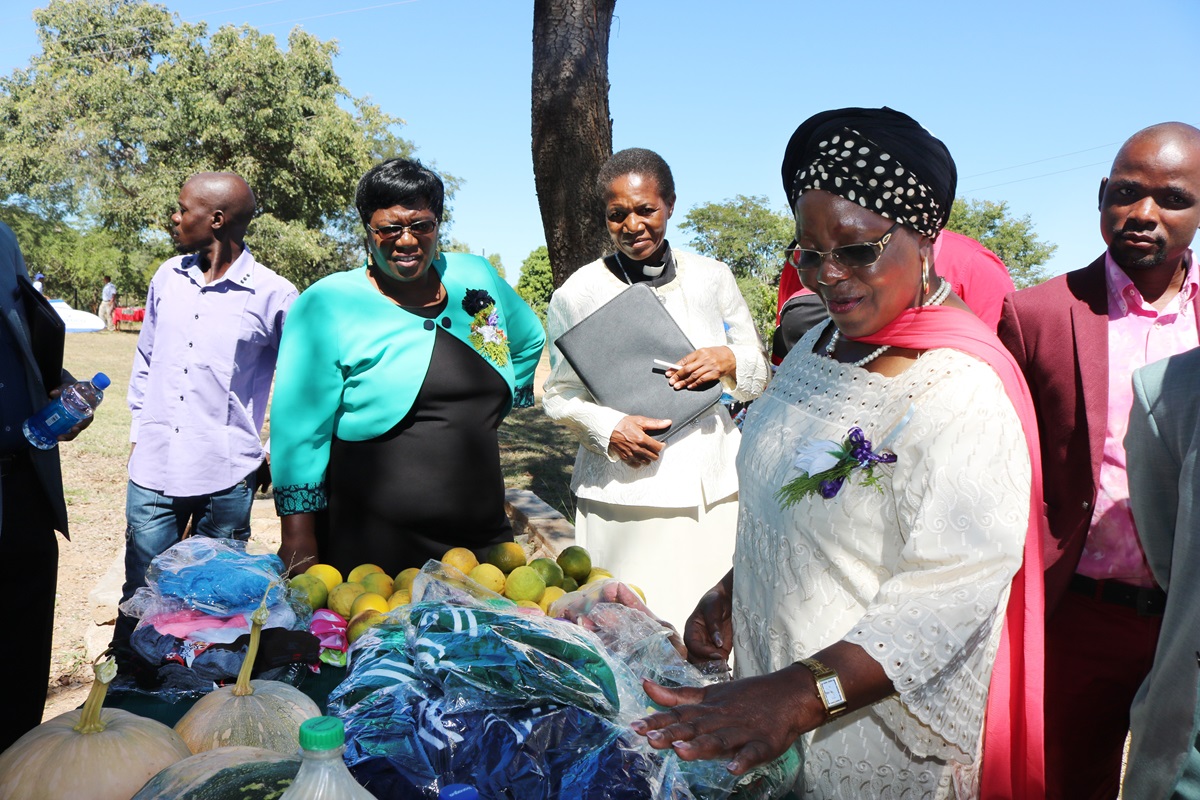The United Methodist Church in Zimbabwe is helping link rural communities with business opportunities in an effort to “evangelize through economic empowerment.”
That was the theme of a business expo hosted by the church in the Marage District on May 5.
The Rev. Pauline Nyamudzura, the area’s district superintendent, said most of those who live in Marange have no income. It’s difficult to preach the good news to people who are hungry and living in poverty, she added.
Poverty alleviation is one of The United Methodist Church’s Four Areas of Focus. The church believes that empowerment is critical in reducing rural poverty.
The guest of honor at the expo was the government’s Women and Youth Affairs minister, Sithembiso Nyoni, who applauded the initiative by the church.
“This is good news that entrepreneurship is being taken seriously at the village level, and for the church and other organizations to take it so seriously, it is a blessing,” Nyoni said.
“If we all look together as a nation, regardless of where you come from, and look at poverty as an ill that we all have to deal with — not just the government, not just NGOs, not just churches, not businesses — let’s all help each other.”
The Rev. Milton Musamba, pastor at Chikwariro United Methodist Church in the Marange District, preached at the event on being a faithful servant. He encouraged everyone to work hard.

Women from the Marage District in Zimbabwe celebrate new opportunities at a business expo hosted by The United Methodist Church. The theme of the event was “Evangelizing Through Economic Empowerment.” Photo by Priscilla Muzerengwa, UMNS.
“The way you work will determine the shoe you will wear. The way you work will determine the house you will stay in,” he said.
According to Nyoni, a member of parliament for Nkayi North in Matebeland North, her constituency is one of the poorest in the country, often dealing with drought.
Despite their challenges, she said, the women of Nkayi wanted to help empower other women. They donated 2,000 eggs to Nyoni, who took the eggs for hatching.
The hatchery company was so moved by the gesture of love shown by the Nkayi women that they also donated 3,000 day-old chicks to give to people in need.
The church received 1,000 chicks, another 1,000 were donated to the Marange community and the other 3,000 were to be distributed in other districts in the Manicaland Province, including areas devastated by Cyclone Idai in March.
Nyoni said it is her hope that business will prosper in Manicaland, and people will be able to produce and sell near and far.
She encouraged recipients to empower others.
Susan Dzobo, who leads United Methodist Women in the Marange District, appreciated the gesture of the Nkayi women as a challenge.
“It is our prayer that we all catch the spirit of helping others. Irrespective of what we have or what surrounds us, we would want to do the same,” she said. “Poverty or living in a drought area should not be a hindrance to giving.”
The Grain Marketing Board of Zimbabwe and Silo Foods Industry also were present at the expo to explain the feed requirements per chick and the cost.
The Zimbabwe Women Microfinance Bank responded by offering instant loans to purchase the feed, vaccines and other requirements to grow their new business.
“The chicks are already here and need feed. You might not have the funds to purchase the feed. We are ready to give you enough loans to take you through the project,” said Mandas Makarinda, chief executive officer for the bank. “We cannot go away without an assurance that all the necessary support is available to fulfill the dream.”
The business expo also featured exhibitors displaying a variety products from farm produce to handmade crafts.
“We are so thrilled to see the varied enterprises that women are engaging in,” said Makarinda. “They are working with what they have, and the most important thing is to link this to the market. And if they want to expand their projects, that is why the women’s bank is there.”
Marketing is one of the biggest challenges cited by most exhibitors, who work hard to produce crops and other products, but often find no buyers.
“Our biggest challenge in Manicaland and Marange is market. People work so hard to grow tomatoes and fruits … but everything will end up rotting with no buyers,” said Ellen Gwaradzimba, minister of state for Manicaland. “The church has taken this initiative to explore this very challenging aspect of business.”
The Marange community and exhibitors learned about an e-commerce platform that can help them reach local and international markets.
Producers and retailers can sell their commodities online using mobile money and electronic funds transfers. That removes the middleman and creates value and opportunity for all parties, said Moses Mwagura, chairman for the Zimbabwe Chamber of Commerce in Manicaland.
He said the platform offers a solution to those without available markets and encouraged everyone to visit the site.
“Those with products can be uploaded online and sell anywhere in Zimbabwe, thereby reaching a nationwide market,” he said.
Gwaradzimba encouraged the community to form groups and associations according to areas of interest and start new projects.
“Industrialization has to come to the rural areas … We want to curb the rural urban migration by bringing development here where the majority of people are,” she said.
Exhibitor Selter Masasi said being able to sell goods at local markets has been a game changer.
“What has excited me most is that we can now have markets. Our produce used to rot at home with no buyers,” Masasi said.
More business expos and market opportunities are being planned for the future in the district.
That’s good news for Patricia Majoni, another exhibitor, who said the money they made at markets outside their district was often spent on travel costs.
Gwaradzimba sees the church’s investment in economic empowerment in rural communities as the beginning of greater things with far-reaching impact.
“We now have the destiny of our province in our hands,” she said.
Muzerengwa is a communicator for the Zimbabwe East Conference.
News media contact: Vicki Brown, news editor, newsdesk@umcom.org or 615-742-5469. To read more United Methodist news, subscribe to the free Daily or Weekly Digests.
Like what you're reading? Support the ministry of UM News! Your support ensures the latest denominational news, dynamic stories and informative articles will continue to connect our global community. Make a tax-deductible donation at ResourceUMC.org/GiveUMCom.




